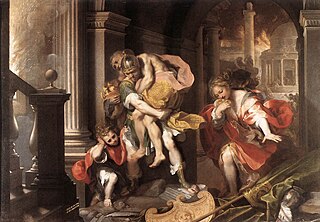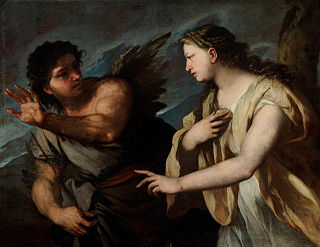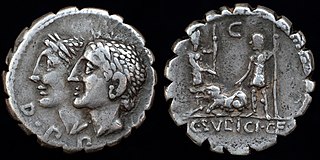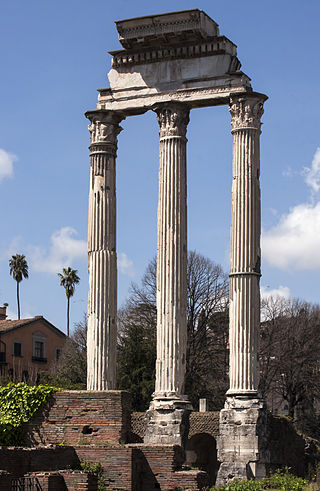
In the myth and religion of ancient Rome, Juturna, or Diuturna, [1] was a goddess of fountains, wells and springs, and the mother of Fontus by Janus. [2]

In the myth and religion of ancient Rome, Juturna, or Diuturna, [1] was a goddess of fountains, wells and springs, and the mother of Fontus by Janus. [2]
Juturna was an ancient Latin deity of fountains, [3] who in some myths was turned by Jupiter into a water nymph – a Naiad – and given by him a sacred well in Lavinium, Latium, [4] as well as another one near the temple to Vesta in the Forum Romanum. Her original home was said to be on the mythological river Numicius. [2]

The pool next to the second well in the Roman Forum (Rome) was called Lacus Juturnae. A local water nymph or river-god generally presides over a single body of water, but Juturna has broader powers which probably reflect her original importance in Latium, where she had temples in Rome and Lavinium, a cult of healthful waters at Ardea, and the fountain/well next to the lake in the Roman forum. It was here in Roman legend that the deities Castor and Pollux watered their horses after bringing news of the Roman victory at the Battle of Lake Regillus in 496 BC (Valerius Maximus, I.8.1; Plutarch, Life of Aemilius Paulus, 25.2, Life of Coriolanus, 3.4).
A temple was erected in her honour after the first Punic war. [2]
Holloway has argued that the goddess shown carrying a winged helmet on early Roman coinage is Juturna, but her iconography is largely unknown. A later altar relief from the Temple of Castor and Pollux in the Roman Forum may depict her. A Roman festival was held in her honor on January 11, when she was given sacrifices and honored by the fontani (the men who maintained the fountains and aqueducts of Rome). [7]
Juturna Lake in Antarctica is named after the deity.

The Aeneid is a Latin epic poem that tells the legendary story of Aeneas, a Trojan who fled the fall of Troy and travelled to Italy, where he became the ancestor of the Romans. Written by the Roman poet Virgil between 29 and 19 BC, the Aeneid comprises 9,896 lines in dactylic hexameter. The first six of the poem's twelve books tell the story of Aeneas' wanderings from Troy to Italy, and the poem's second half tells of the Trojans' ultimately victorious war upon the Latins, under whose name Aeneas and his Trojan followers are destined to be subsumed.

Venus is a Roman goddess whose functions encompass love, beauty, desire, sex, fertility, prosperity, and victory. In Roman mythology, she was the ancestor of the Roman people through her son, Aeneas, who survived the fall of Troy and fled to Italy. Julius Caesar claimed her as his ancestor. Venus was central to many religious festivals, and was revered in Roman religion under numerous cult titles.

Proserpina or Proserpine is an ancient Roman goddess whose iconography, functions and myths are virtually identical to those of Greek Persephone. Proserpina replaced or was combined with the ancient Roman fertility goddess Libera, whose principal cult was housed in the Aventine temple of the grain-goddess Ceres, along with the wine god Liber.

Vesta is the virgin goddess of the hearth, home, and family in Roman religion. She was rarely depicted in human form, and was more often represented by the fire of her temple in the Forum Romanum. Entry to her temple was permitted only to her priestesses, the Vestal Virgins. Their virginity was deemed essential to Rome's survival; if found guilty of inchastity, they were buried or entombed alive. As Vesta was considered a guardian of the Roman people, her festival, the Vestalia, was regarded as one of the most important Roman holidays. During the Vestalia privileged matrons walked barefoot through the city to the temple, where they presented food-offerings. Such was Vesta's importance to Roman religion that following the rise of Christianity, hers was one of the last non-Christian cults still active, until it was forcibly disbanded by the Christian emperor Theodosius I in AD 391.

Picus was a figure in Roman mythology, the first king of Latium. He was the son of Saturn, also known as Stercutus. He was the founder of the first Latin tribe and settlement, Laurentum, located a few miles to the Southeast of the site of the later city of Rome. He was known for his skill at augury and horsemanship.

Ascanius was a legendary king of Alba Longa and the son of the Trojan hero Aeneas and Creusa, daughter of Priam. He is a significant figure in Roman mythology because of his genealogy: as the son of the Roman founding father Aeneas, himself the son of the goddess Venus and the Trojan prince Anchises, he was regarded as an ancestor of the Roman people. Under his additional name Iulus, he was claimed as the particular ancestor of the gens Iulia, the family of Julius Caesar, and therefore a progenitor of the first line of Roman emperors, the Julio-Claudian dynasty. In some Roman genealogies, he is also made to be an ancestor of Romulus and Remus. Together with his father, he is a major character in Virgil's Aeneid.

In Greek mythology, the naiads, sometimes also hydriads, are a type of female spirit, or nymph, presiding over fountains, wells, springs, streams, brooks and other bodies of fresh water.

Anna Perenna was an old Roman deity of the circle or "ring" of the year, as indicated by the name.

In ancient Roman religion, the Di Penates or Penates were among the dii familiares, or household deities, invoked most often in domestic rituals. When the family had a meal, they threw a bit into the fire on the hearth for the Penates. They were thus associated with Vesta, the Lares, and the Genius of the pater familias in the "little universe" of the domus.

In ancient Roman religion and myth, Janus is the god of beginnings, gates, transitions, time, duality, doorways, passages, frames, and endings. He is usually depicted as having two faces. The month of January is named for Janus (Ianuarius). According to ancient Roman farmers' almanacs, Juno was mistaken as the tutelary deity of the month of January, but Juno is the tutelary deity of the month of June.

Juno was an ancient Roman goddess, the protector and special counsellor of the state. She was equated to Hera, queen of the gods in Greek mythology and a goddess of love and marriage. A daughter of Saturn and Ops, she was the sister and wife of Jupiter and the mother of Mars, Vulcan, Bellona, Lucina and Juventas. Like Hera, her sacred animal was the peacock. Her Etruscan counterpart was Uni, and she was said to also watch over the women of Rome. As the patron goddess of Rome and the Roman Empire, Juno was called Regina ("Queen") and was a member of the Capitoline Triad, centered on the Capitoline Hill in Rome, and also including Jupiter, and Minerva, goddess of wisdom.
Ferālia was an ancient Roman public festival celebrating the Manes which fell on 21 February as recorded by Ovid in Book II of his Fasti. This day marked the end of Parentalia, a nine-day festival honoring the dead ancestors.

The Lacus Iuturnae, or Lacus Juturnae or Spring of Juturna, is the name of a formal pool built by the Romans near a spring or well in the Roman Forum. The pool was part of a shrine dedicated to the water nymph Juturna, and the name Lacus Iuturnae is also used for the spring and the shrine, both next to the pool.

The Temple of Castor and Pollux is an ancient temple in the Roman Forum, Rome, Central Italy. It was originally built in gratitude for victory at the Battle of Lake Regillus. Castor and Pollux were the Dioscuri, the "twins" of Gemini, the twin sons of Zeus (Jupiter) and Leda. Their cult came to Rome from Greece via Magna Graecia and the Greek culture of Southern Italy.

The Fasti, sometimes translated as The Book of Days or On the Roman Calendar, is a six-book Latin poem written by the Roman poet Ovid and published in AD 8. Ovid is believed to have left the Fasti incomplete when he was exiled to Tomis by the emperor Augustus in 8 AD. Written in elegiac couplets and drawing on conventions of Greek and Latin didactic poetry, the Fasti is structured as a series of eye-witness reports and interviews by the first-person vates with Roman deities, who explain the origins of Roman holidays and associated customs—often with multiple aetiologies. The poem is a significant, and in some cases unique, source of fact in studies of religion in ancient Rome; and the influential anthropologist and ritualist J.G. Frazer translated and annotated the work for the Loeb Classical Library series. Each book covers one month, January through June, of the Roman calendar, and was written several years after Julius Caesar replaced the old system of Roman time-keeping with what would come to be known as the Julian calendar.

Saturn was a god in ancient Roman religion, and a character in Roman mythology. He was described as a god of time, generation, dissolution, abundance, wealth, agriculture, periodic renewal and liberation. Saturn's mythological reign was depicted as a Golden Age of abundance and peace. After the Roman conquest of Greece, he was conflated with the Greek Titan Cronus. Saturn's consort was his sister Ops, with whom he fathered Jupiter, Neptune, Pluto, Juno, Ceres and Vesta.

Roman mythology is the body of myths of ancient Rome as represented in the literature and visual arts of the Romans, and is a form of Roman folklore. "Roman mythology" may also refer to the modern study of these representations, and to the subject matter as represented in the literature and art of other cultures in any period. Roman mythology draws from the mythology of the Italic peoples and shares mythemes with Proto-Indo-European mythology.
The Lympha is an ancient Roman deity of fresh water. She is one of twelve agricultural deities listed by Varro as "leaders" (duces) of Roman farmers, because "without water all agriculture is dry and poor." The Lymphae are often connected to Fons, meaning "Source" or "Font," a god of fountains and wellheads. Lympha represents a "functional focus" of fresh water, according to Michael Lipka's conceptual approach to Roman deity, or more generally moisture.